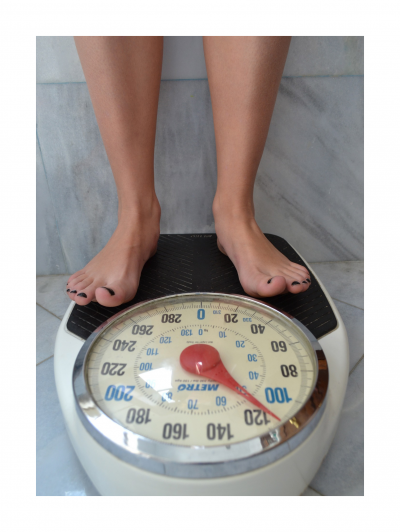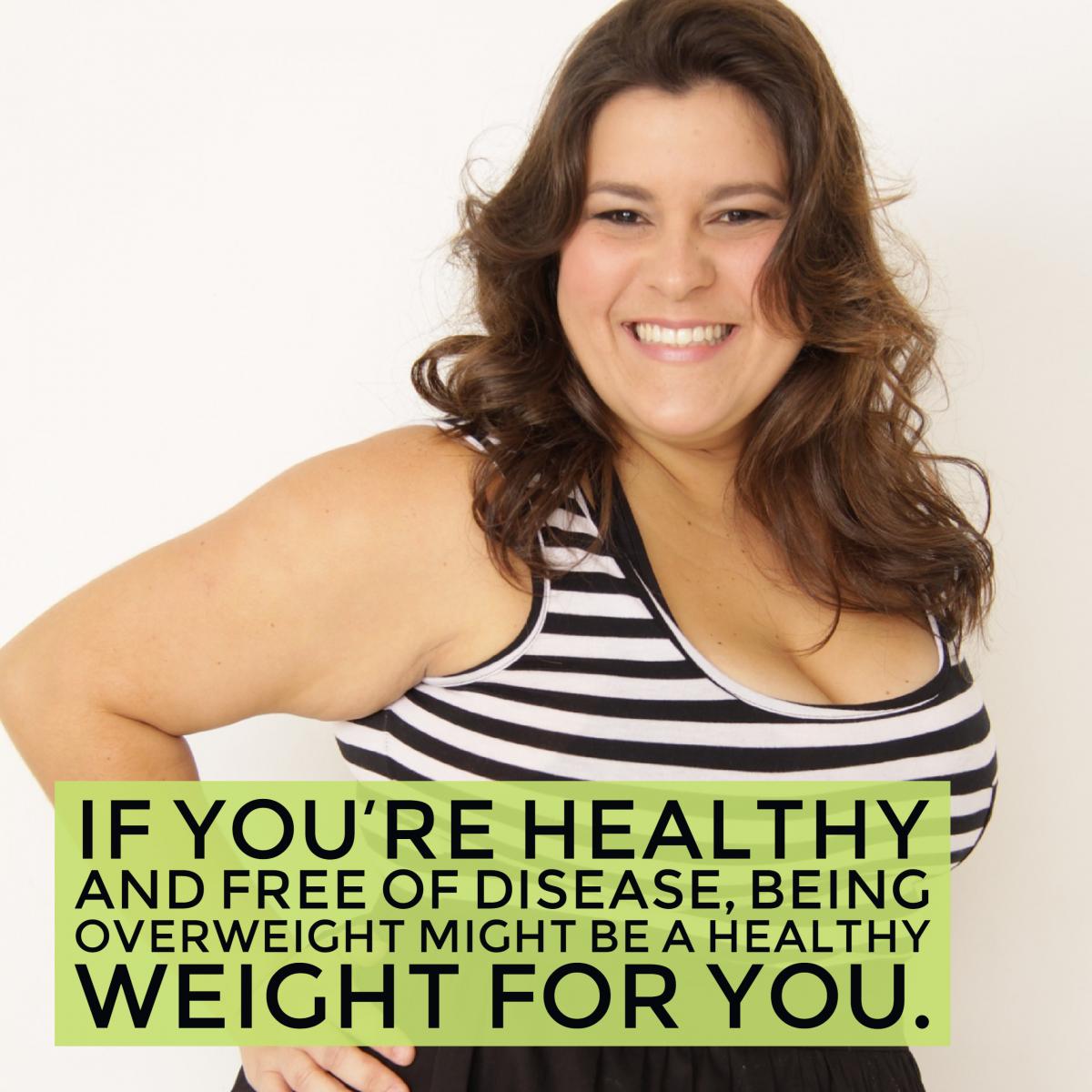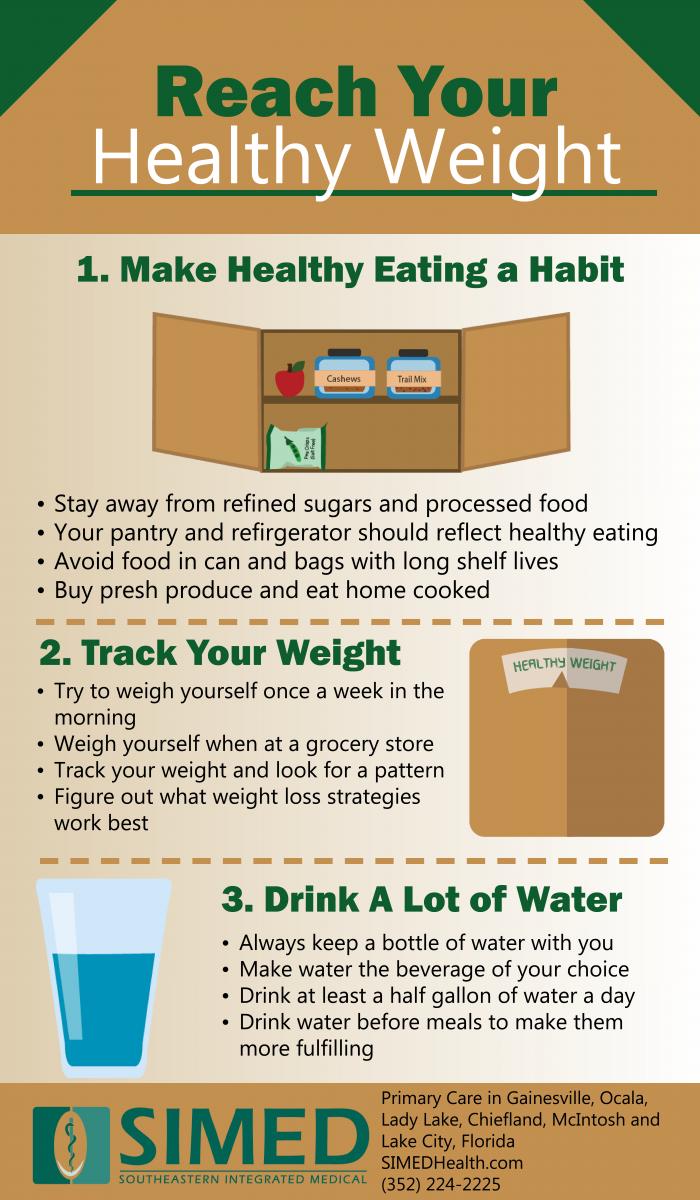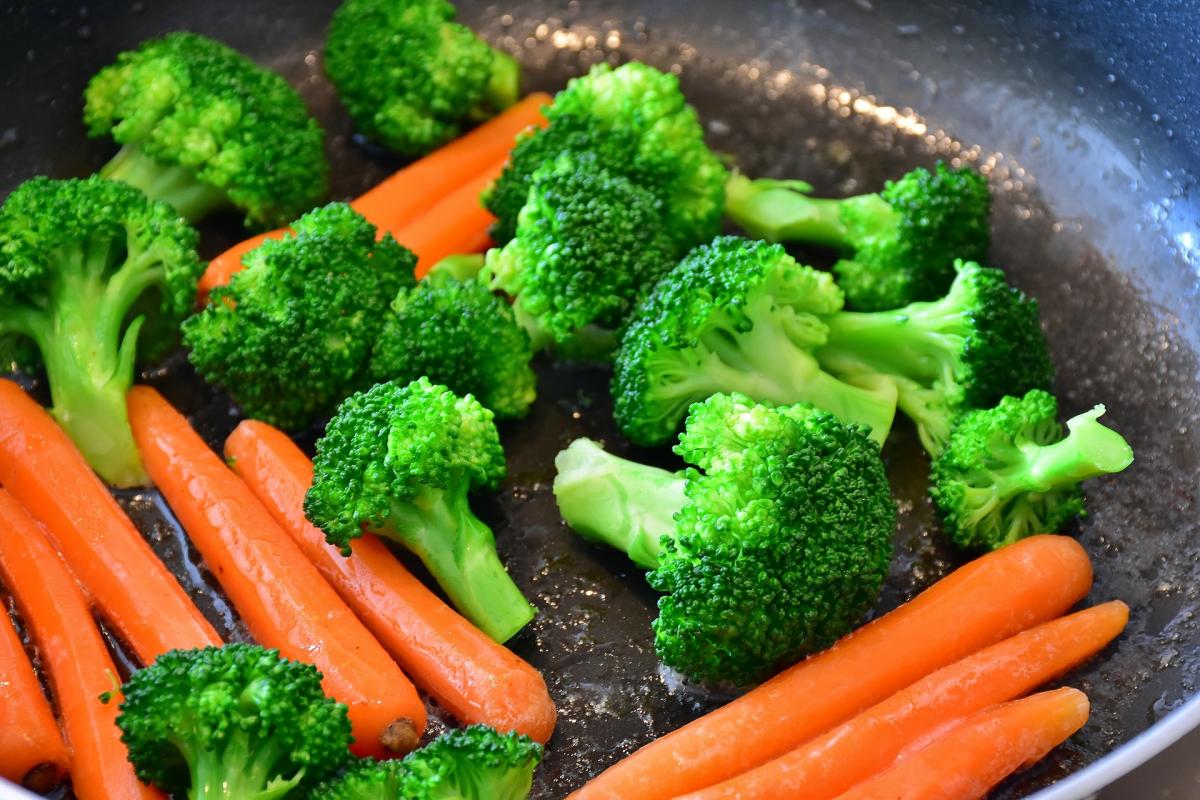
January 18 – 24 is Healthy Weight Week, and at SIMED, we want to help make sure you reach and maintain your healthy weight.
We spoke with Dr. Eric Svestka, a SIMED Primary Care doctor in Gainesville, about when, why, and how to lose weight and succeed. Dr. Svestka answered and helped with some of the common problems and questions people have when they realize they might want to lose weight.
How can I tell if I should lose weight?
Finding your healthy weight isn’t a one size fits all situation. It varies depending on the person.
Talk to Your Doctor
If you’re worried about your weight, you should probably meet with your primary care doctor and go over what would be good for you. Any SIMED Primary Care doctor can help you figure out a weight loss plan.
Depending on whether or not you have issues with blood pressure, blood sugar and/or heart disease, you might find that staying overweight is fine for you or you could find that you need to be more aggressive and bring your weight down.
Calculate Your BMI
A BMI calculator can indicate whether you’re in the normal weight range for your height. You can find a BMI calculator for free online. An overweight BMI falls between 25 and 29.9 on the scale. An obese BMI is 30 and above.
Everyone benefits from getting out of the obese range, but your goals beyond that may differ. For example, a football player may need a higher BMI than a rock climber, but both are still healthy weights.
Consider Your Wellness
If you have no health problems, you may not see a benefit in losing enough weight to bring you into the normal range, but you could still benefit from a healthy lifestyle. However if you have a health issue like diabetes, losing weight could help you ease off the medications. Or maybe you just want to be more comfortable with your physical appearance. Whatever your motivation is, losing weight in the end could still improve your overall wellness, so if you’re considering it, you should go for it.
Think about Your Overall Health

If your weight is causing diseases like high blood pressure, diabetes, high cholesterol, heart disease, or others, losing weight could help you become healthier.
Your weight could also be limiting your activities. For example, you might not be able to get down on the floor and play with your children or play pickup softball with your friends. You might even find that you can no longer bend down to tie your shoe. A heavier weight increases your risk for diabetes, sleep apnea, heart disease and other health problems so changing your lifestyle could go a long way.
How Do I Start Losing Weight?
SMART Goals
SMART stands for Specific, Measurable, Actionable, Realistic, Time-based goals. Let’s break that down.
- Specific – Typically a standard goal for most people is to lose about 5% of their body weight over a three to six month period.
- Measurable – Weight is measurable. You would measure your weight in pounds or kilograms.
- Actionable – To lose weight, you are going to diet. Dieting is the only action that will work.
- Realistic – Setting a goal to lose 5% of your weight in six months is realistic. If you weighed 300 pounds and tried to lose 100 pounds in six months, that wouldn’t be very realistic. You could change that goal to five years, and you’d be back at losing about 5% of your weight in six months.
- Time Based – Usually a three to six month period is a pretty good amount of time to see results. Losing about a pound or a half a pound a week is a sustainable goal.
Track Your Weight
If you have a scale you should:
1. Weigh yourself once a week
2. Weigh yourself first thing in the morning when you’re undressed
3. Record your weight and track it over time
Keeping a log will help you hold yourself accountable and see whether what you’re doing is working for you. If it isn’t working, that doesn’t mean you’re doing it wrong. It just means you haven’t found the right method of weight loss that works for you. Don’t get frustrated or become hard on yourself. Just try a new method of weight loss and avoid the one that didn’t work.
If you don’t have a scale:
1. Weigh yourself when you visit the grocery store
2. Know your weight will fluctuate based on time of day and what you’re wearing
3. Look for overall patterns when recording your weight
Again, keep a log, and if something isn’t working. Don’t give up; just try a new method.
 How Do I Maintain a Healthy Weight?
How Do I Maintain a Healthy Weight?
1.Establish the habits
You don’t want to think about making healthy choices for the rest of your life. It should become a part of your daily routine. Just as you shower and brush your teeth, you can establish a habit of eating healthy.
Make sure you’re staying away from refined sugars and processed foods. Eat fruits for desserts and vegetables with every meal. You can treat yourself when it’s a special occasion, but every night does not deserve cookies.
Eating healthy is easier than it sounds. The more you work on eating clean, the more your pantry should reflect the goals you’re trying to meet. You shouldn’t have chips, cookies, and candy or other packaged foods in your cabinets. Instead you should have foods like nuts (almonds, for example), dried fruits and vegetables, you can even make your own home made trail mix. In your fridge, you should have fresh fruits and vegetables like, broccoli, cauliflower, carrots, sweet potatoes, and other healthy foods.
You’re going to do whatever is easiest and most convenient for you no matter how strong willed you are. Make eating healthy easy and accessible and put barriers between you and your “weak spots”. If unhealthy food isn’t in your house, you can’t eat it.
2. Drink Water
Always keep a bottle of water with you. You should drink a minimum of a half a gallon of water a day and make water your default beverage of choice. Not soda, not tea, not coffee, just regular water.
3. Exercise
While exercise might not be key to losing weight, it is very important for maintaining weight. Exercise 30 minutes a day regularly every week. Similar to the dieting rule, what you like best is what you should stick with.
If you enjoy carbs, you probably shouldn’t go on a carb free diet. If you enjoy red meat, you don’t have to cut that out. The same thing applies to exercise. If you hate running, then don’t run. If you’re someone who loves to run, keep running.
High Intensity Interval Training
Scientifically the type of exercise doesn’t matter, but the way you do it does. You could begin to practice high intensity interval training where you do short bursts of high energy exercise and then rest. The goal during the bursts is to get your heart rate near your maximum.
For example, you would jump rope for a minute, then rest for a minute, then jump rope for a minute, then rest for a minute. Or you could sprint for thirty seconds and then walk for 30 seconds and repeat.
Exercising with high intensity interval training has proven to be the most effective way to burn calories. You even continue to burn more calories after you’re done exercising. You should check with your Primary Care doctor first, to ensure your health condition allows, but if you’re trying to maintain your healthy weight, it can help.
Strength Training VS. Cardio
There isn’t really a difference in overall health benefits between anaerobic (like lifting weights) and aerobic (like running) exercises. In fact, anaerobic exercise might be more beneficial for you because it increases lean muscle mass and increases your basal metabolic rate. The misconception is that the person running is more in shape, but that’s not necessarily the case.
4. Maintain a Clean Diet
1. Avoid Restaurant food
Both fast food and sit down restaurants could hurt your health. Restaurants don’t want to help you lose weight. They want you to come back so they can sell you more. Restaurant food is usually high sodium, has high levels of bad fats, and has high levels of carbs because those foods are addicting. Even the green or healthy options at restaurants can still be oversized and full of salt.
2. Foods in cans and bags
While a can of beans is acceptable, food that has a long shelf life and is highly processed should be avoided. Try to keep the shelf life under a week to reduce the amount of food with sodium and preservatives. So don’t go for the can of Chef Boyardee.
3. Buy fresh produce and eat home cooked meals
Establish a routine of eating home cooked meals. You only need to know three recipes to make the first few weeks of your diet bearable. From there you could add an additional meal a week to build up your options. You want to plan to make sure you’re ready before you start trying to lose weight. Try a few recipes and figure out what out what you like so when you switch to a healthier, more sustainable diet, you set yourself up for success. You could even delay your plan to eat healthier food a week or two to prepare, find recipes you like, meal plan out your entire first week and have you pantry and fridge stocked with these healthy options. Don’t forget that what you don’t buy can be just as important as what you do, so let you pantry run out of things like candy, chips and cookies.
What Happens if I Feel Like It’s Not Working?
1.Don’t Beat Yourself Up. It’s Totally Okay.
We need to stop criticizing ourselves and beating ourselves up if we don’t lose weight on the first thing we try. We’re our worst critics. Keep up the mentality that you still want to lose weight and realize that while what you were doing wasn’t working for you that doesn’t mean losing weight isn’t for you
2. See How You Can Fix Things.
Sometimes you can sabotage yourself. Make sure to check serving sizes. Were you accidentally taking two servings without realizing it?
You might also need to reduce your daily caloric intake even more. With dieting and weight, there is no one size fits all. People have different metabolic rates, even if they are the same height and weight. We all have that friends who never exercises, eats the worst food, and is still the same size as they were in high school, and there are also people who must consciously think about everything they eat. Your path to health may be more or less challenging than those around you and that’s ok.
 3. Have an Accountability Buddy
3. Have an Accountability Buddy
Have a partner who is also on board with you who you can understand when you feel frustrated. You can both go through everything together and inspire each other to stay the course on the journey.
Humans are relational creatures so if you feel like you’re on an island and there’s no other person with you, you’re going to want to leave. That’s the reason why programs like Weight Watchers and Jenny Craig are so successful. It’s not because of some magical dietary formula, but because it’s a community where your voice is heard and you can feel accepted.
Having a social support system or someone that will cheer you on and help you stay on top of your diet can guarantee success. Whatever happens, don’t give up on trying to be a healthy weight. Stay with it, and try new things.
If you have more questions about your weight and weight loss, you can schedule an appointment with Dr. Svestka or any of our other Primary Care doctors in Gainesville, Ocala, Chiefland, Lady Lake, McIntosh, and Lake City. Call (352) 225-2225 or schedule an appointment online today.